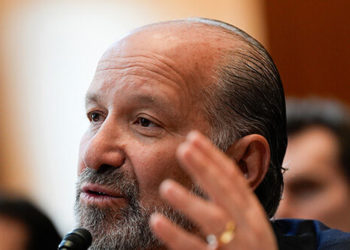The Senate Committee on Commerce, Science and Transportation on Monday asked the inspectors general of the Army and Department of Transportation to conduct parallel audits of the agencies’ aviation safety practices around Washington, D.C., in the wake of a deadly midair collision earlier this year.
The bipartisan letter was led by Senators Ted Cruz, Republican of Texas and the panel’s chairman, and Maria Cantwell of Washington, the committee’s top Democrat, and signed by all of the panel’s Democrats and most of its Republicans.
In it, the senators emphasized that the Jan. 29 accident, in which an Army Blackhawk helicopter slammed into American Airlines Flight 5342, highlighted a dangerous and continuing pattern of near misses between military and commercial aircraft around Ronald Reagan National Airport.
They called on the inspectors general to “specifically address whether improved F.A.A. and Army procedures, communication systems or adherence to existing protocols would increase aviation safety” in the area, referring to the Federal Aviation Administration.
The letter comes days before the committee is set to be briefed behind closed doors by representatives of the F.A.A., the Army and the National Transportation Safety Board about the crash and other recent close calls between commercial flights and military aircraft in areas around Reagan National Airport and the Pentagon. The briefing is scheduled for Wednesday, according to a congressional aide with knowledge of the plans who was not authorized to speak publicly.
Securing these internal watchdog inquiries has been a top priority for Families of Flight 5342, a group formed by the relatives of the American Airlines passengers who were killed. In a statement, the group said that the senators’ bipartisan request “represents a critical first step toward rebuilding public trust after this tragedy.”
“We urge the inspectors general to dedicate all resources necessary to conduct these audits swiftly and thoroughly, and to release their findings publicly to the fullest extent possible,” the statement continued.
The National Transportation Safety Board has been investigating the crash, and released a preliminary report in March recommending that the F.A.A. permanently ban helicopter traffic along a military route known as Route 4 when the airport’s Runway 33 is in use, and find an alternative route for military operations in such situations. But the internal watchdogs of the Army and F.A.A. have not yet launched investigations into the collision.
The office of the Department of Transportation’s inspector general habitually releases audit reports to the public, but similar releases from the Army’s inspector general are more limited.
The senators gave each department watchdog specific targets for their inquiries.
They instructed the Department of Transportation’s acting inspector general to examine the F.A.A.’s design and management of flight routes and airspace around Reagan National Airport. The letter also requests details into the watchdog’s oversight and management of gaps in aviation safety, its analysis of data from previous near misses, and whether exemptions from requirements to use tracking gear — which the Army helicopter had turned off shortly before the Jan. 29 crash — have been appropriately doled out.
The letter also asks the F.A.A.’s inspector general to review the role and effectiveness of the agency’s D.C. Helicopter Working Group. In late March, Jennifer Homendy, the chairwoman of the N.T.S.B., told senators that the board was having difficulty identifying who was involved in the group and discerning what work it had done.
An N.T.S.B. spokesman did not return a request for comment about whether the board had acquired that information since.
In the letter, the panel asked the Army’s inspector general to investigate how it coordinates with the F.A.A. during operations around Washington. That includes policies around pilot training and qualification, the condition and use of tracking technology and maintenance protocols for Blackhawk helicopters.
The senators also requested the Army’s watchdog scrutinize the Army’s system for reviewing incidents when military and commercial aircraft fly too close to each other in an effort to prevent future close calls.
In a news release accompanying the letter on Monday, committee leaders pointed out that the Army had yet to provide the panel with an August 2024 memo on policies for when tracking systems are used during missions and exercises in the area around Washington, which they requested in late March.
Karoun Demirjian is a breaking news reporter for The Times.
The post Senators Demand Government Watchdog Inquiries Into D.C. Plane Crash appeared first on New York Times.




